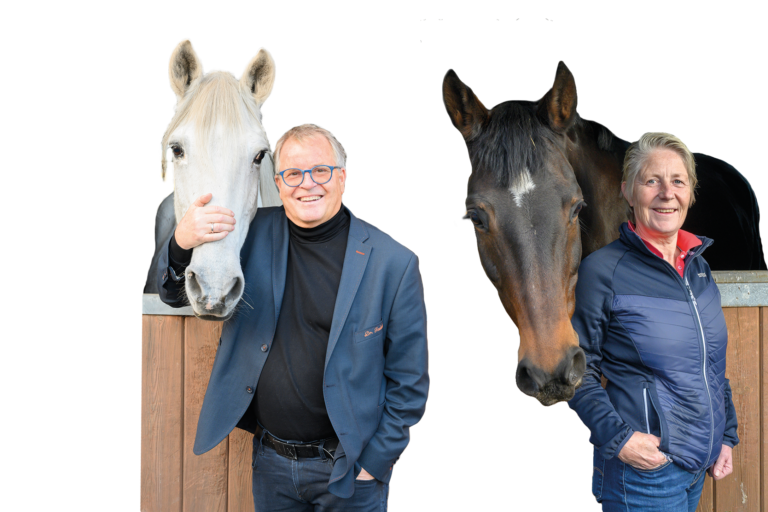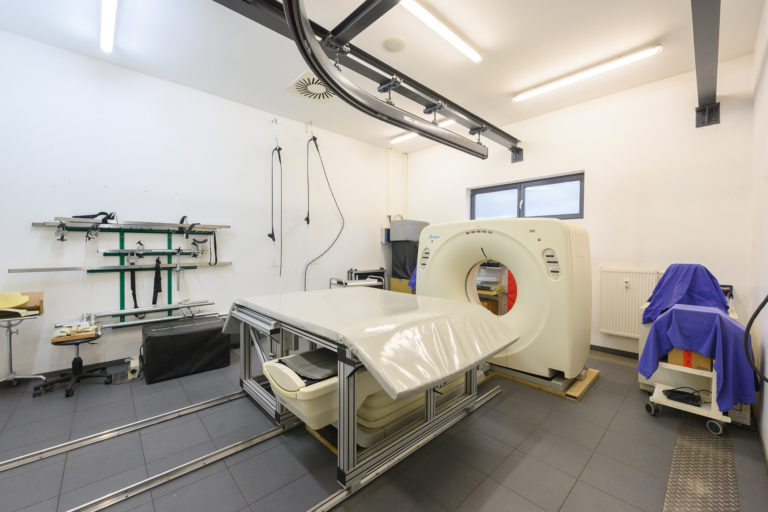
Despite the idyllic surroundings, the infrastructure could hardly be better: Set in the Havelland district on the western fringes of Berlin, between Potsdam and Falkensee, is Pferdeklinik Seeburg – one of the leading centres for equine medicine in Germany. In addition to striving to make its four-legged patients feel comfortable, the hospital has also created an atmosphere that sets the horses’ owners at ease. The warm orange tone on the hospital’s ubiquitous logo also adorns the buildings in Seeburg. A warm, welcoming reception area and a cafeteria complete with a wooden veranda and pond offer a pleasant setting for owners to wait. Though it might resemble a holiday destination at first glance, the site is actually a state-of-the-art equine hospital.
This spot on the edge of the Döberitzer Heide nature reserve has been home to the Pferdeklinik Seeburg since 2005. Even then, the hospital enjoyed an exceptional reputation – doubtless due in large part to the man at the helm, equine specialist and FEI veterinarian Dr Andreas Faulstich, who founded the hospital in 1995. Today, more than 35 dedicated staff ensure the wellbeing of the patients at Seeburg. The equine hospital, structured as a limited liability company (GmbH), is now led by a trio of partners, who are in turn supported by seven salaried vets, student assistants, specialist office staff, veterinary assistants and stable staff.

Our services for you:
A workshop, computer workstations and a spacious seminar room available for training sessions are all housed in a separate building. Naturally, meeting rooms are also available and allow the staff to explain even complex issues to their patients’ owners using modern technologies and specimens. For Andreas Faulstich, whose dogs are ever-present at his side, honesty is the most important aspect. “We never try to sell unnecessary treatments. It’s part of our success,” he says with conviction.
“Each member of the hospital’s team has their own areas of specialism, attends advanced training suited to their needs, and shares their expertise with the team in brief presentations.”
“The Pferdeklinik Seeburg attaches the utmost importance to teamwork. The staff also discuss purchases and acquisitions as a team.”
One of the specialisms of this holistically minded equine hospital and referral clinic is colic surgery – which, in addition to internal medicine, osteosynthesis and foal medicine, is a particular focus of another specialist veterinarian at Seeburg, Marlis Gronenberg. Dr Andreas Faulstich’s areas of specialism are sports medicine, orthopaedics, clinical diagnostics to ascertain the causes of lameness, diseases and disorders of the spine, eyes and respiratory system, as well as the application of shockwave therapy. The hospital’s third partner, Dr Dirk Köhler, primarily oversees outpatient cases, focusing on dental treatments among other areas. Seeburg’s mobile veterinary service comprises six vehicles with a full complement of tools and equipment. The hospital also boasts impressive diagnostic capabilities, ranging from in-house laboratory testing to ECGs, endoscopies, magnetic resonance therapy, ultrasound scans, cardiac examinations and computed tomography. The latter diagnostic technique is further facilitated by special ball-bearing technology that Dr Faulstich helped to develop.


The Pferdeklinik Seeburg attaches the utmost importance to teamwork. “I love my work and I love my team,” says Faulstich. A resident of Babelsberg, a district of Potsdam south-west of the German capital, Faulstich considers himself a true Berliner. Each member of the hospital’s team has their own areas of specialism, attends advanced training suited to their needs, and shares their expertise with the team in brief presentations. The staff also discuss purchases and acquisitions as a team. Veterinary rounds take place twice daily, with ‘grand rounds’ held every Monday; this ensures the staff are in constant commu-
nication and benefit from a continuous transfer of knowledge. What’s more, the team gather together to relax and celebrate at the hospital’s annual summer and Christmas parties.

Andreas Faulstich first started riding as a young boy and, though he subsequently focused on other things, his passion for horses was reignited as a student. While studying at the Freie Universität Berlin, he also worked as a student assistant – at the FU’s equine hospital, of course. From there, his career path was linear: He became a vet at the age of just 24 and launched his own mobile veterinary practice in 1989 – “with an old, second-hand VW and an office comprising a typewriter and filing cards,” he remembers with a smile. Then, in 1995, he founded his first clinic, where his modern-day partners were originally his assistants. While all this is true, Andreas Faulstich could well have been a film star. In fact, he once was, and he has a deer of his own to prove it – the golden-bronze deer on his Bambi Award, which he won for playing the leading role in Peter ist der Boss, a children’s television series in the 1970s. “I’m the only vet with a Bambi and an Oscar,” he laughs. Oscar, of course, is his son’s name. Faulstich spends as much time with his son as his work permits – and is also a dab hand in the kitchen.
Speaking of cooking: Pferdeklinik Seeburg produces its own line of feed supplements, developed by Andreas Faulstich himself, which have been available to buy online since 2019.
A bright idea from the boss; it certainly won’t be his last.
1. Veterinarians
11
Specialists with internationally recognised (European / US) qualifications
–
Specialists with national qualifications
4
Veterinarians, assistant veterinarians
7
2. Veterinary technicians and horse grooms with additional medical training
8
3. Horse grooms
1
4. Administrative staff
4
5. Other staff
7
6. Box stalls
42
Normal equine box stalls
33
Padded box stalls
2
Box stalls for mares with foals
4
Isolation box stalls
3
7. Examination / treatment rooms
3
8. Operating rooms
3
For procedures on standing horses
2
For procedures on lying horses
1
9. Paddocks
10
10. Pastures
–
11. Horse walker
–
12. Other
Scales; solarium; inhalation chamber to treat respiratory conditions; horse trainer (treadmill)

11
internationally recognised veterinary surgeons in different areas of expertise take care of the four-legged patients
Weighting of the specialist areas for Equine Hospital Seeburg GmbH
Soft tissue surgery
Weighting: 51 to 80%
Equine soft tissue surgery primarily relates to abdominal/colic surgery and operations in the region of the urinary system, the sexual organs, and the upper and lower respiratory tracts, as well as operations on the skin.
Orthopaedic surgery
Weighting: 81 to 100%
Orthopaedic surgery is surgery on the musculoskeletal system of a horse. This includes operations relating to the bone skeleton, such as fracture fixation. It also includes endoscopic and arthroscopic procedures on joints, bursae and synovial sheaths, as well as operations on ligaments and tendons.
Orthopaedic diagnostics & therapy
Weighting: 81 to 100%
The field of orthopaedic diagnostics & therapy deals with musculoskeletal diseases and disorders, particularly relating to lameness.
Dentistry
Weighting: 81 to 100%
Dentistry involves prophylactic examinations of teeth and the oral cavity as well as the diagnosis and treatment of dental diseases and associated diseases of the paranasal system.
Internal medicine
Weighting: 51 to 80%
The specialist field of internal medicine subsumes a number of subareas and deals with the diagnosis and treatment of diseases of the internal organs. These include diseases of the gastrointestinal tract, the respiratory system, the urinary system, the blood and blood-forming organs, the muscles, the nervous system and the skin, plus hormonal and metabolic disorders and all infectious diseases.
Cardiology
Weighting: 51 to 80%
Cardiology is a separate specialty within the field of internal medicine and concerns the diagnosis and treatment of cardiovascular diseases and disorders, including cardiac arrhythmias, valve disorders, myocardial and pericardial disease and congenital cardiac malformations.
Intensive care and emergency medicine
Weighting: 51 to 80%
Intensive care and emergency medicine involves administering first aid in serious emergencies as well as providing care to and monitoring horses and foals with life-threatening illnesses. This also includes post-operative care to patients in need of intensive care.
Neonatology
Weighting: 81 to 100%
The field of neonatology is concerned with the diagnosis and treatment of all diseases and disorders experienced by newborn foals. The fields of internal medicine, intensive care and emergency medicine also play a central role in such care.
Sports medicine
Weighting: 51 to 80%
Sports medicine entails the diagnosis and treatment of performance-related diseases and illnesses in sport horses and workhorses. Special dynamic examination methods are often used in this field, including performance tests, endoscopy during exercise, kinetic and kinematic gait analysis, and saddle pressure measurements.
Rehabilitation medicine
Weighting: 21 to 50%
The field of rehabilitation medicine is concentrated on recovery following surgical procedures, medical movement therapy to treat back pain and abnormal posture, and improving the quality of life of animals suffering from debilitating diseases such as arthritis or neurological impairments.
Ophthalmology
Weighting: 21 to 50%
Ophthalmology deals with diseases and functional disorders of the eyes, their adnexa, and the optic nerve up to the visual cortex in the brain – the visual processing centre. Ophthalmologists also perform surgical procedures on eyes.
Reproduction medicine
Weighting: 51 to 80%
Reproductive medicine involves the diagnosis and treatment of diseases relating to the sexual organs and the udders as well as breeding suitability tests, assisted reproduction, pregnancy-related diagnostics and obstetrics.
Anaesthesia
Weighting: 51 to 80%
The specialist field of anaesthesia is concerned with professionally sedating and anaesthetising horses and sparing them unnecessary pain. Thanks to state-of-the-art methods and gentle techniques, it is now possible to perform complicated surgical procedures and life-saving emergency operations on seriously injured or sick horses and to transport them safely.
Diagnostic imaging
Weighting: 51 to 80%
Diagnostic imaging is the process of examining a horse using digital X-ray technology, ultrasound, computed tomography (CT), magnetic resonant imaging (MRI) and scintigraphy. Nowadays, many of these diagnostic techniques do not require general anaesthesia and can be performed on a standing horse.
Field service
Weighting: 81 to 100%
Veterinarians in field service provide emergency and primary healthcare to horses where they live. Modern field service providers possess a variety of mobile tools and equipment, allowing them to perform some in-depth examinations and treatments on-site.
Transport services
Weighting: 81 to 100%
Professional large-animal transport services safely transport seriously injured or diseased horses – such as horses with severe colic – to an equine hospital. Horses with complex fractures or severe neurological conditions can also be transported safely and with due care, either using a harness to alleviate the load on the fracture or by lying the animal on a mat. The same applies for transporting recumbent horses. Some largeanimal transport services also specialise in recovering horses from extreme situations, such as rescuing horses who have fallen using a winch, crane or helicopter.
Weighting of the specialist areas: range of services offered compared with the maximum service spectrum in the corresponding area.
Equine Hospital Seeburg GmbH
Engelsfelde 1 A, 14624 Dallgow-Döberitz
